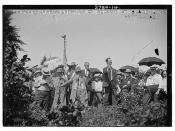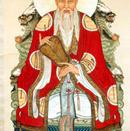Comparative Eastern Influences Response CheckPointTaoism vs. ConfucianismMoore & Bruder (2005) state that, much of our knowledge of Taoism philosophy comesfrom Lao Tzu and Chuang Tzu, Lao's follower. According to the text, Confucianism wasfounded by Confucius (551-479 B.C.E.). "Confucian political philosophy has dominated Chineselife in a way unequaled by any similar philosophy in the West" (Moore & Bruder, 2005, p. 510).
While Lao Tzu and Confucius respected each other's differing philosophies, they also tried topersuade each other to take their side.
"Confucius sought to become an advisor to a ruler and directly to change society for thebetter, using heroes of the past as models" (Moore & Bruder, 2005, p. 503). According to thetext; Tzu's vision to change society was very different than Confucius. Moore & Bruder (2005)state that, Tzu's ideas are used to gain power and stay in power. However, there are various waysone might look at Taoism. According to the text, Lao Tzu believed as did Greek PhilosopherSocrates that a person with great wisdom can still be found to be uninformed.
"And to act on thatignorance under the pretense that it is knowledge, both held, is folly that leads not to progressand betterment within the individual and society but to the opposite effect" (Moore & Bruder,2005, p. 503). Tzu felt that Confucianism was lacking here, proposing solutions without wisdom.
Moore & Bruder (2005) state that, Tao is like an empty dish that embraces energy (ch'i)in every single thing. "In contrast to Confucius, who believed that the Tao can be improved onLao Tzu believed that the Tao cannot be improved on" (Moore & Bruder, 2005, p. 504). Onequotation that reveals Tzu's insights is: "To pretend to know when you do not know is a disease"(Moore & Bruder, 2005, p. 504). Lao Tzu philosophies were insightful but seem judgmental incontext.


